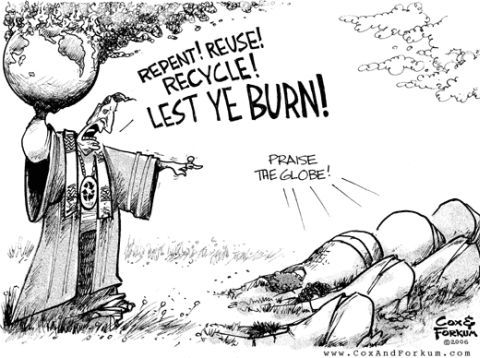The first speaker was Terry Collins, a professor at CMU. His presentation linked climate change and environmental protection with moral and ethical obligations. Noting that everyone is responsibility for the future of the environment, he encouraged everyone to engage in "transgenerational justice". Not only are present concerns important (e.g., the economy and war), but also the future environment for our human successors. His term of choice was "Sustainability Knights" which harnesses the ethical actions of medieval knights and the long-term vocabulary of sustainability. Though he only mentioned religion briefly, I find connection with his arguments and my current research on the relationship between religious rhetoric and climate change. Appealing to morality and ethics are values associated with religion, as they are persuasive according to biblical and religious hierarchy and authority. Religious members are traditionally associated with anti-environmental in accordance with White's 1967 theory of "dominion". From biblical passages, humankind is given dominion and power over the environment, undermining preservation and sustainable importance. Currently, there has been a slow but steady movement of religious groups and organizations that have begun to support the Evangelical Climate Initiative. This changes are only in their infancy, but I agree with Collins that this religious appeal to morality and values are an important part of the solution to mitigating climate change.
The final speaker with Noe Copley-Woods who worked at McGee Hospital in Pittsburgh. She documented a practical change that could be implemented to combat climate change. In the presentation, she showed the audience photographs of the waste produced by one birth. The trash bags were filled with hundreds of pieces of gauze, dozens of disposable medical tools, towels, bed sheets, and various other paper waste. For one child, over 30 pounds of waste was produced that became hospital trash. Worries about infection stop many hospitals from re-using and sterilizing equipment. Estimates place annual hospital waste at 50,000 pounds which Noe says contributes heavily to the pollution of our environment. Personal tips and changes are important, but making changes to larger institutions is a more effective and meaningful way to address pollution and environmental damage.
One of the largest takeaways from the panel was how to make these effects and consequences of climate change meaningful for the general public. Cohen's and Copley Woods's presentations in particular showed me how persuasive personal and drastic images can be for motivating action and interest. Although some of the more extreme and severe consequences are farther in the future, there are enough present day examples that can serve to incite progress and response. The danger in entering this conversation, however, is inviting similar persuasive tactics by those who argue for current examples as counterarguments to global warming.




No comments:
Post a Comment